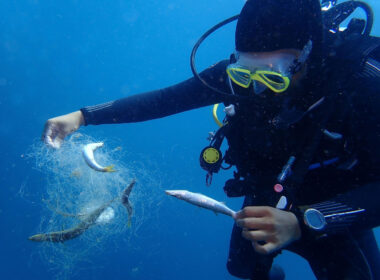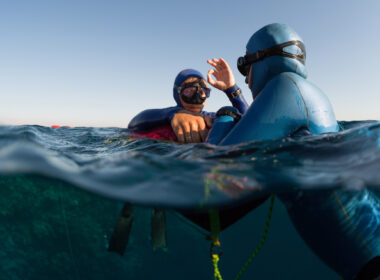Traveling is a controversial topic where sustainability is concerned. As divers, we care about the environment and want to do our best to reduce our impact on the world. On the other hand, we want to travel to exciting places and discover the underwater world, which doesn’t go hand in hand, or does it? Let’s take a look at how to become a responsible traveler.

Packing Responsibly for Your Trip
When packing for a trip abroad, practicing responsible packing can help minimize your environmental impact and promote sustainable travel. Where possible, pack light, traveling with lighter luggage reduces fuel consumption and carbon emissions, especially if you’re flying. Only bring what you need and avoid overpacking. Consider versatile clothing items that can be mixed and matched for different outfits. Pack reusable items to minimize waste during your trip. Carry a reusable water bottle, travel mug, and utensils. These can help reduce single-use plastic consumption and encourage sustainable habits.
Don’t forget, if you take any single use items with you to remote places without proper waste disposal facilities, take the packaging back home with you!
Go Green as a Responsible Traveler
Opt for eco-friendly toiletries such as solid shampoo bars, soap bars, and toothpaste tablets. These products reduce plastic waste as they typically come in minimal or no packaging. Use refillable travel-sized containers for liquids if necessary. Say no to single-use plastics by packing reusable alternatives. Bring a cloth or tote bag for shopping and reusable food containers or beeswax wraps for snacks.. Look for eco-friendly travel accessories such as bamboo toothbrushes, natural fiber travel towels, and eco-friendly travel adapters. These small choices can collectively make a positive impact on the environment.
By adopting responsible packing practices, you can help reduce waste, conserve resources, and promote sustainable travel wherever you go.
Flying Responsibly
When it comes to responsible travel, flying can have a significant impact on the environment due to carbon emissions. While completely eliminating air travel may not always be feasible, there are several steps you can take to minimize your carbon footprint and practice responsible travel when flying. Always favor nonstop flight options, nonstop flights are generally more fuel-efficient than connecting flights since takeoffs and landings use up a significant amount of fuel. Lower your carbon footprint by flying in economy class, compared to business or first class since more passengers can be accommodated in the same amount of space. Choosing economy class helps to distribute the environmental impact across a greater number of people.
Offset your carbon footprint
Many airlines offer carbon offset programs that allow you to compensate for the emissions produced by your flight. These programs typically involve contributing to projects that reduce greenhouse gas emissions, such as renewable energy initiatives or reforestation projects. Consider offsetting your carbon emissions to neutralize the environmental impact of your flight.
Choose fuel-efficient airlines, some airlines have a better environmental track record than others. Do some research and choose airlines that prioritize fuel efficiency and have implemented measures to reduce their carbon footprint.
Consider using public transportation, shared rides, or airport shuttles to get to and from the airport. This helps reduce the carbon emissions associated with individual car travel.
Be conscious of your consumption during the flight. Avoid single-use plastics and bring a reusable water bottle or travel mug to refill during the journey. Dispose of waste in the proper recycling or garbage bins provided by the airline.
Support Sustainability
Look for airlines that are committed to sustainability and have implemented measures to reduce their environmental impact. These airlines may prioritize fuel efficiency, invest in newer and more fuel-efficient aircraft, or implement recycling and waste management programs.
In some cases, it may be possible to choose alternative modes of transportation such as trains or buses for shorter distances or when feasible. These options typically have lower carbon emissions compared to flying.
While air travel has a significant environmental impact, being mindful of these tips can help reduce your carbon footprint and practice responsible travel when flying. Additionally, supporting efforts to develop sustainable aviation technologies and advocating for carbon reduction measures within the aviation industry can contribute to long-term solutions.
Be a Responsible Tourist
Being a responsible tourist involves respecting the local culture, environment, and communities while visiting landmarks and booking tours. Before your trip, familiarize yourself with the waste management practices of your destination. Find out about recycling facilities or programs and follow local guidelines for waste disposal to minimize your impact. Follow guidelines and regulations in place to protect the environment. Dispose of waste properly, use designated paths and trails, and avoid damaging or removing any natural or historical artifacts.
Conserve resources such as water and energy by taking shorter showers, reusing towels, and turning off lights and electronics when not in use. Be conscious of your consumption and strive to minimize waste.
Be Respectful
Before visiting a landmark or cultural site, familiarize yourself with the local customs, traditions, and dress codes. Respect religious and cultural practices, and adhere to any guidelines or restrictions in place. Choose locally owned accommodations, restaurants, and businesses to
support the local economy. Engage with local artisans and buy authentic souvenirs that are locally made, promoting sustainable livelihoods and cultural preservation.
Be Sustainable
Look for tour operators that prioritize sustainability, community engagement, and ethical practices. Consider operators that support local economies, hire local guides, and have a commitment to environmental conservation. Keep noise levels to a minimum, especially in quiet or sacred areas. Be considerate of other visitors and the local residents. Avoid disruptive behavior and follow any rules or instructions given by authorities or guides.
Be Mindful
Take the time to learn about the history, cultural significance, and ecological importance of the landmarks or sites you visit. This will enhance your experience and deepen your appreciation for the place you are exploring. Be mindful and respectful when taking photos, especially at sensitive or sacred sites. Ask for permission when photographing people and respect their wishes if they decline. Avoid excessive use of camera flashes that may damage artwork or artifacts. Leave the site as you found it. Do not litter or leave any waste behind. Respect the natural and cultural heritage of the area by not removing any plants, artifacts, or rocks.
Part of being a responsible tourist is to not be a burden on that country, this is why travel and/or diving insurance is highly important. Some countries cannot afford to treat you without up front payment, or backing from an insurance company. Going on a trip? Get covered today.
Remember to always prioritize ethical tourism and respect the local culture and environment during your trip.
Get Involved
There are many different ways that you can get involved and make a difference. Consider making a donation or volunteering with local conservation organizations that work to protect and preserve landmarks or natural sites such as marine ecosystems. Your support can contribute to the long-term sustainability of these areas as well as help preserve and restore habitats for future generations.
Stay updated on local regulations, protected areas, and guidelines specific to the dive sites you plan to visit. Respect any restrictions or rules implemented to protect sensitive marine environments.
Education
Continuously educate yourself about the marine environment, its inhabitants, and the challenges they face. Share your knowledge and encourage fellow divers and travelers to adopt responsible diving practices.
Did you know that we have partnered up with Green Fins to encourage more educated and sustainable divers? Our members receive a discount on the green fins e diver course.
Get your DiveAssure membership today.
By being a responsible tourist, you can have a positive impact on the destinations you visit, support local communities, and help preserve the cultural and natural heritage of the landmarks and sites you explore. As a diver, you can help preserve the beauty and biodiversity of our oceans for years to come.






